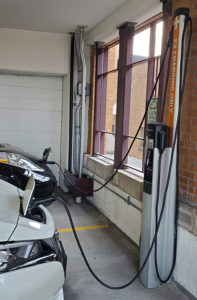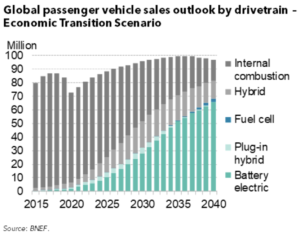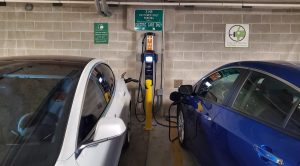
The first twelve EV Readiness Program cohort communities received their “EV Ready” Community awards on Thursday, Dec. 7, 2023.
Working Collaboratively to Become EV Ready
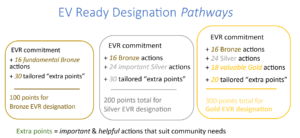
To earn EV Ready Community Bronze, local governments must submit an EV Readiness (EVR) letter of commitment, complete 16 required Bronze actions, and earn 30 extra points of their choosing. The chart above also describes the requirements for earning Silver or Gold.
In the fall of 2022, the Caucus invited municipalities to participate in the new EV Readiness Program to prepare to meet the growing demand for electric vehicles (EVs) and EV charging infrastructure. Qualifying local governments applied to join an EV Readiness cohort and receive free technical assistance and training in a variety of critical areas as they work toward the designation of “EV Ready Community.”
Local government members of the EV Readiness cohorts follow a pathway toward EV Ready Bronze, Silver or Gold by completing a number of fundamental tasks presented in the EV Readiness Checklist. With guidance and resources assembled by the Caucus’ EV Readiness Team, municipal leaders develop clear permitting for EV charging infrastructure, analyze zoning and parking codes to address barriers to EV infrastructure, engage the community, and participate in technical and safety training for staff. Municipalities may also tailor actions to suit the needs of their own community.
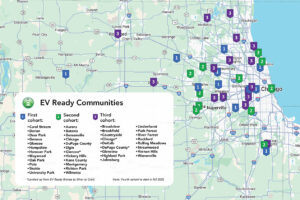
This map shows where the EV Readiness Program first, second, and third cohort communities are located. Click on the map to enlarge it.
The second, updated version of the EV Readiness Checklist was crafted over the course of six months with the help of the EV Ready Advisory Committee (EVRAC). Some 70 EVRAC members, including mayors, managers, and other local government staff members, as well as representatives from councils of governments, regional planning organizations, Argonne National Laboratory, EV charging station companies, IBEW (International Brotherhood of Electrical Workers), environmental and energy-focused nonprofit organizations, and economic development organizations, contributed nearly 350 hours during 18 meetings to create the robust EV Readiness Checklist and focused, priority pathways to earn Bronze, Silver or Gold EV Readiness.
In the fall of 2022, the Caucus opened the EV Readiness Program application to communities.
- The first learning cohort started in December 2022 and finished the program with an award ceremony in December 2023: Carol Stream, Darien, Deer Park, Geneva, Glencoe, Hampshire, Hanover Park, Maywood, Oak Park, Polo, Skokie, and University Park. The Village of Oak Park earned gold designation, while the other communities in the first cohort earned bronze.
- The second cohort started in the summer of 2023 and includes Aurora, Batavia, Bensenville, Chicago, DuPage County, Elgin, Hickory Hills, Kane County, Montgomery, Richton Park, and Wilmette. They finished the program in the summer of 2024. Glencoe leveled up from bronze to silver during this cohort. Kane County and the Village of Montgomery earned silver. The other communities in the second cohort earned bronze.
- The third cohort started in November of 2024 and includes Broadview, Brookfield, Countryside, DeKalb, Glenview, Highland Park, Johnsburg, Lindenhurst, Park Forest, River Forest, Rockford, Rolling Meadows, Streamwood, Vernon Hills, and Warrenville. Chicago leveled up to earn gold, and DuPage County leveled up to earn silver. Two additional communities in the cohort earned gold: River Forest and Rolling Meadows. The other communities in the cohort received bronze recognition. The third cohort award ceremony was held in the summer of 2025.
- The fourth cohort started work in September of 2025. Organizations include Blackhawk Hills Regional Council, Burr Ridge, Deerfield, Des Plaines, Downers Grove, Grayslake, Northbrook, Pingree Grove, Riverwoods, Winnetka and Woodridge. Four communities from the third cohort have chosen to join the fourth cohort to level up from bronze to either silver or gold, including Brookfield, Highland Park, Streamwood, and Vernon Hills.
If your community is interested in participating in the fifth cohort, please join the EV Readiness Program waitlist. Municipalities must adopt the Greenest Region Compact to participate in the EV Readiness Program. Find information and verify that your community has adopted the GRC here. Applicants must also provide a letter of commitment to work collaboratively through the EV Readiness Program. (The letter of commitment fulfills requirement CR-1 in the EV Readiness Checklist.) Cohorts are limited in size and equity will be considered in assembling the cohorts.
ComEd is the generous sponsor of the EV Readiness Program.
EV Readiness in the Greenest Region Compact and Climate Action Plan
The Metropolitan Mayors Caucus has an underlying interest in clean transportation because it relates to many of the consensus goals of the Greenest Region Compact (GRC):
![]() Support efficient transportation that uses resources wisely.
Support efficient transportation that uses resources wisely.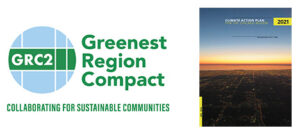
![]() Integrate sustainability into transportation policies, programs and regulations.
Integrate sustainability into transportation policies, programs and regulations.
![]() Operate a safe, clean, and efficient fleet.
Operate a safe, clean, and efficient fleet.
In the Climate Action Plan for the Chicago Region, the EV Readiness Program relates to the objective “decarbonize transportation” and the strategies, “Adapt development processes to accelerate investment in EV charging infrastructure,” and, “Transition fleets to low- and zero-emission vehicles.”

